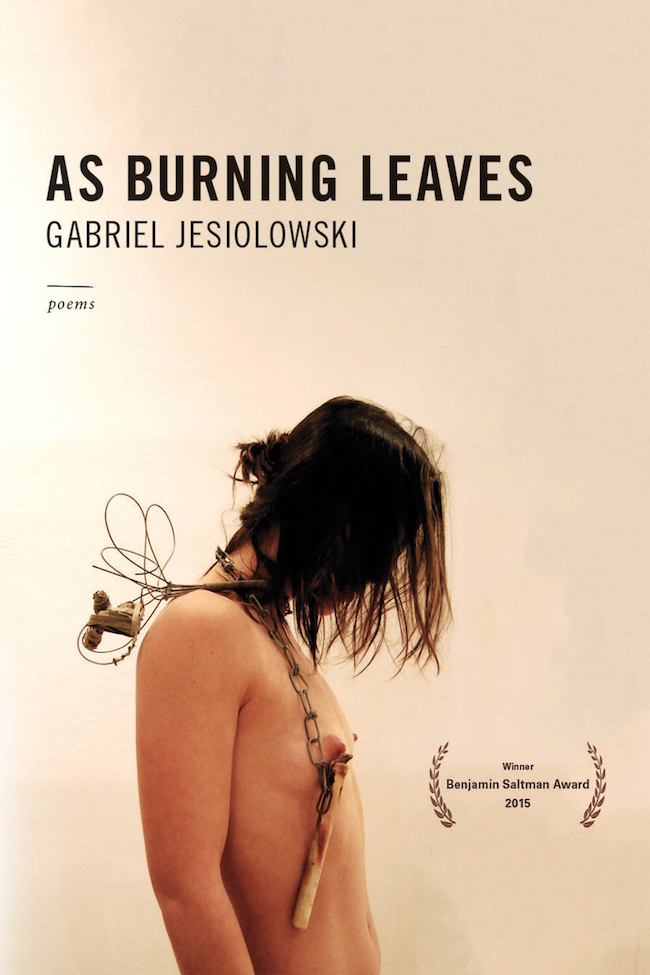
It’s hard not to begin with the arresting cover image of Gabriel Jesiolowski’s As Burning Leaves. The photograph—last leaf, 2012, by the author—depicts someone bare-chested and looking down, hair covering their expression, with a weighted chain wound around their neck. The part of the chain tossed over a shoulder ends in wire loops, reminiscent of the smallest insect wings that might yet carry this person aloft. The other end has a sort of rough handle, resting near a nipple, juxtaposing the metal of the chain against the vulnerable and/or resilient skin. It is a portrait of the work at hand, and not simply because the book’s repeated calls to ritual or repeated actions suggest a closeness to performance art. Like the hidden face of the photograph, As Burning Leaves invites us into a relationship of lovers both intimate and removed. Like the contrast of the bare chest with the metal necklace, the poems create a lingering but absent eroticism as they question a body’s gender, tenderness, and malleability. Like the sparse background of the photograph, the poems unfold across the dramatic backdrop of empty space that is the roads of Pennsylvania and Ohio.
These tensions are captured in an early poem called “Fielded,” which I returned to over and over again as a kind of organizing principle. It reads in its entirety:
nine
scarring rituals
the female oak tree
slit into with verse
so faint is the here / the after
outside—the trees are drained for sap
This poem elegantly articulates an idiosyncratic structure, a mythically gendered natural landscape, the damage or capacity of verse, and the layered divisions between inside and outside, the here and the later. There is violence in the slit tree, scarred and draining, but there is also a kind of inevitably or pleasure in it, found in its creation through ritual. This happens across the poems, in which an emotional experience is held in what seem to be a series of structured movements of an actor in and across a landscape. In a later poem, “we invent the passing of / railcars” because “the folk song says that we need a little sadness.” When a possible ritual is not performed in another poem, the weather answers in a kind of reassuringly consistent response: “because I do not precaution that rain will flood the field, the rain floods the field.”
This tension between performance and response, between everyday natural phenomenon and bodily feeling is particularly balanced in the book’s title, and the poem that also bears that name. “As burning leaves” is a descriptive simile as well as a durational phrase that delimits the time in which a sensation leaves the body. Each of these proceeds from an absent referent, an organizing or originary void: the leaves tumbling across a windy plain, not what that movement characterizes (i.e. the body of a self and/or a lover); the progressive stasis of a receding feeling without an accompanying fulfillment. In the title poem, this set of absences becomes attached to the ways a body/mind diffuses into the environment, how, in a phenomenological sense, we are always more than our strict contours, and always understanding ourselves as several. Jesiolowski writes:
without the compass I move into another body
that does not erase my own, for all this time
I have tried to dissolve the
the periphery
………………………………………………………………………
I grid the coordinates of our
separation as though stars
as burning
leaves
I love how in Jesiolowski’s work the individual can also be the relational, can also be the environment. In this book, which folds into its loneliness and lyrical language affectingly candid statements of gender negotiation (“the stubborn, unwieldy boy inside of me”; “I don’t want a gender or work that can pass / as work”; “I’ve started the testosterone injections”), the phrase “I move into another body / that does not erase my own” might be about gender transition, but might equally be about the intimate exchange of sex. And yet the desire for blurred bodies extends outward into non-human entities: the receding fire here becomes the stars. In “The Distance,” “the sound of crescent grass sweeping past my body” is as intimate as not having left the house in eleven days.
Part of this affective work of attunement comes from the forms of the poems, which are filled and surrounded by space—Jesiolowski might call it “wind,” as in how “the absence of your hand / fills with wind.” In addition to poems like the aforementioned short, sparse utterances, there are poems whose lines float back and forth across the page as if they are falling, as well as poems in sections marked by carets (^) which suggest the drawn scrawl as interruption, a mark on stone or “the palette knife scrap[ing] the dissolving pubic bone.” Together these forms enact something of the speaker’s desire to be permeable, as when Jesiolowski writes, “how was I ever impenetrable / now—I’m like a cloud.” I think too of these poems as remnants of speech, the recovered remnants of echoes “exhale[d] into a tree,” where they imprinted themselves on the bark.
Carl Phillips chose As Burning Leaves for the 2015 Benjamin Saltman Award from Red Hen Press—a prize which, although it is an open prize, has given us several other excellent debuts in recent memory, including Brynn Saito’s The Palace of Contemplating Departure and Lillian-Yvonne Bertram’s But a Storm is Blowing from Paradise. Like those books, Jesiolowski has crafted a book of movement and landscape, in which individuals quietly but significantly consider what it is to move and transform from place to place. In Phillips’ judge’s citation, he imagines everyone in the network of As Burning Leaves (the speaker, the lover, the reader) inhabiting a ghostly realm that we cannot be sure of by our very existence within it. But the lover is so consistent across this book, so specific (traveling to Ohio, ignoring clams, wearing a chest binder)—if anyone is a ghost in the poems, it seems to me, it is the reader. I felt as a spirit reading As Burning Leaves, summoned to witness a malleably gendered artist dissolving themselves into their environment as a practice of grief. When midway through the book I encountered the second section’s epigraph from Inger Christensen’s alphabet, I thought, of course. alphabet similarly documents the ways in which presence and absence form what Jesiolowski calls “coordinates of […] separation” across a natural world, and Christensen has too the incantatory quality of Jesiolowski’s language. So when, in an untitled fragment near the end of the book, Jesiolowski writes “I moved the birch logs / w/out question // ask, quietly— / who owns me?” I understood that question as the opening up of a terrifying freedom, a positing of a new ecology of relationships and attachments based on attunement. It is a call to a new navigation: if we return to the title poem with a slight modification, it is how “without a compass I [can] move into another body.”

S. Brook Corfman is a poet who writes plays, living in a turret in Pittsburgh. This Lambda Literary Fellow's work has appeared in Washington Square, The Journal, Prelude, Ghost Proposal, and OmniVerse, among other places. @sbrookcorfman







